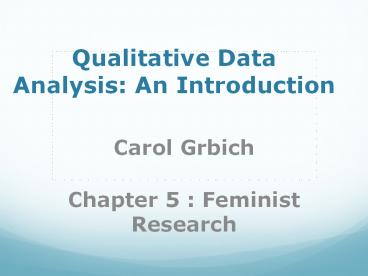Qualitative Data Analysis: An Introduction - PowerPoint PPT Presentation
1 / 8
Title:
Qualitative Data Analysis: An Introduction
Description:
Qualitative Data Analysis: An Introduction Carol Grbich Chapter 5 : Feminist Research Feminist research principles that there is inequality in our society constructed ... – PowerPoint PPT presentation
Number of Views:79
Avg rating:3.0/5.0
Title: Qualitative Data Analysis: An Introduction
1
Qualitative Data Analysis An Introduction
- Carol Grbich
- Chapter 5 Feminist Research
2
Feminist research principles
- that there is inequality in our society
constructed along gender lines - women are
subordinate to men in socioeconomic status and
decision making power. - that current modes of knowledge disadvantage
women by devaluing their ways of knowing - that highlighting the experiences of women
through research and allowing their voices to be
heard may go some way to making inequalities more
widely recognised - that transformation of society through the
empowerment and emancipation of women are
desirable outcomes.
3
The researcher and the researched
- Relationship guidelines
- non-exploitative relationships between you and
those you are researching - exposure of your position, your personal
biography, your emotions and values and how these
impact on data gathering, analytical and
interpretative phases - the voices of the researched should be heard in
their own words and ownership of narratives
should be shared between you and these people in
an egalitarian manner
4
Empowerment of participants
- Ways of managing empowerment
- Recognise the value driven nature of research
- Practice reflexivity
- Participants drive the research agenda
- Focus on improvement of participants lives as
the major outcome - Include a diversity of participants including
elites - Use language which is meaningful to
participants - Contextualise data so readers can make their own
judgments - Present ways in which women may improve their
situation. - (Adapted from Wadsworth 20014-5)
5
Feminist data analysis
- Use feminist theoretical frames
- Focus on an extensive display of participants
voices - Joint ownership of data interpretation
6
Memory Work
- The researcher is also a participant
- Involves the tracing of memories and their
construction from each co-researchers
perspective - The group takes the collective memories and
seeks to understand how each memory as come to be
constructed in this particular way and how
interaction within the wider society has created
and reinforced oppression. - Theoretical constructs are applied to the
memories by the researcher
7
Criticisms of memory work
- Using friends/close acquaintances to form the
group is not ideal - Women with no background nor interest in
academic theory may become subjects and/or
experience minimal emancipation or transformation - The group may tend to indulge in primitive
psychotherapeutics - Marxist frameworks emphasise action as conformity
rather than resistance
8
Limitations of Memory work
- Emancipation is not always the outcome
- Theoretical perspectives are not always
meaningful to participants - How are differences of opinion to be managed in
the group process? - Is it possible to share ownership with a
researcher who will ultimately gain through
publishing the work? - In terms of analysis and final publication, what
happens to the personal material from the first
and second stages? - Whose voices are being silenced when issues of
academic credibility are important? - What happens to notions of emancipation and
transformation when the groups are more
interested in sharing than theorising their
experiences (Onyx and Small
2001)































